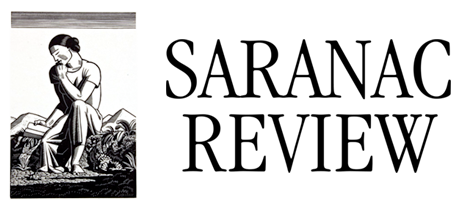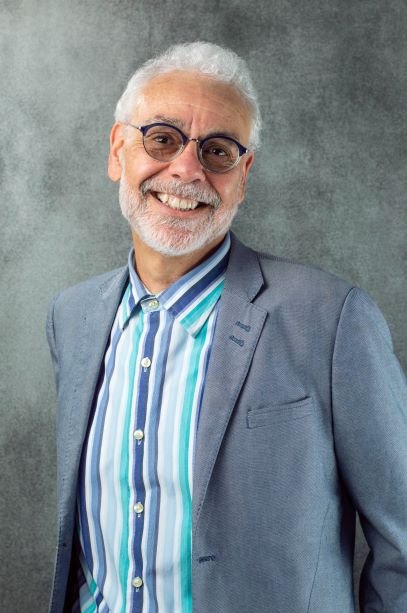For our inaugural online-exclusive issue of Saranac Review, Editorial Assistant Nina Serafini sat down with one of the journal’s founding editors, J.L Torres, to get his perspective on the history of our publication and his hopes for its future. Torres is the author of Migrations, the inaugural winner of the Tomás Rivera Book Prize. His previous publications include another short story collection, The Family Terrorist and Other Stories; the poetry collection, Boricua Passport; and the novel, The Accidental Native. He has also published stories and poems in numerous journals and magazines. A Fulbright recipient, he recently retired as a scholar and professor of American literature, Latinx literatures, and creative writing at SUNY Plattsburgh. Born in Puerto Rico, raised in the South Bronx, he now lives in upstate New York. More information at jltorreswriter.com.
Saranac Review: How did the idea of Saranac Review come to you?
J.L. Torres: Well, it was a communal idea. Four of us were important in the founding of this magazine.
First of all, Linda Young, [a former professor in the English Department at SUNY Plattsburgh]. She was a catalyst, I would say. We always talked about the lack of a magazine on campus, in our writing program. And we thought we should have one. We had a magazine already for student writers, but we thought we should have a professional one.
David Kovacs, who was an adjunct in the department and a musician and writer, served as Fiction Editor for two years.
Then there was Michael Carrino, who served as the Poetry Editor and Co Editor with me, and taught composition and creative writing classes during his long tenure at SUNY Plattsburgh. Michael played an active role in helping launch the journal and to sustain its growth and development.
So the four of us, we were all writers. And, we just thought that it was important to have a presence, literally, you know, in the department. Eventually we got a little support. And then, we started in 2004 with our first edition.
SR: For the first edition, what was your process for finding people to work on Saranac Review? How did you find submissions?
JLT: Initially, we did not have a class like you have now. [SUNY Plattsburgh’s Editing and Publishing seminar]. We had to have students volunteer. The first meeting we had 20 people and by the end of the semester we had five. There was really nothing at stake for students. Once [the creative writing program] became a BA I said, we need to have this be a class. Because it's a lot of work and students should get credit for it.
For many years, even until my retirement, we collaborated with the art department. David Powell [retired art professor] was still on board and had art students help with the layout of the print magazine.
In terms of collecting submissions, we had like, actual baskets. We didn't have Submittable back then! We had to have a whole mailbox in the department for us to handle the submissions, and then we would go through them, and it was really a lot of files. A lot of paper.
So [Saranac Review] is something that I think made our program strong. It was hard at first because this was all new, and typically [publishing a literary journal] is done at a graduate level, and we were doing it with undergraduates.
That’s important. And we take that into consideration, this generation gap between us two. So what I like to read maybe is not what you like to read. But we want younger readers. We have to figure out what young people are liking and why. You know what I mean? We have literally lived in different worlds.
SR: Can you recall any of your favorite pieces from past editions?
JLT: Oh, there's so many. I was very happy to publish certain writers like the great Dominican writer, Julia Alvarez. It was amazing that we got her that early. Also Gregory Pardlo.
You know, this was before he won the Pulitzer. And even then when I saw his pieces, they just hit me immediately: Wonderful.
SR: What impact do you think Saranac Review has had on the SUNY Plattsburgh English department and the college as a whole?
JLT: Well, all I know is that every time that there was some kind of event they come out with a copy, you know, to show parents. [laughs.] So for their marketing it's important. I don't know now because I haven't been there. I retired last year. So in a year, things could change. Obviously it's going digital only now.
We used to have a presence at AWP. People knew of us, and that is a big plus for SUNY Plattsburgh because this is coming out of this small college. So at one time, I think we were the only undergraduate journal in the area aside from Blue Line, [out of SUNY Potsdam]
So, I think in those ways it’s been very beneficial to the college. We also sponsored readings, and little by little we were building a writing community in Plattsburgh and uniting other writers with SUNY Plattsburgh, which I think is something that as a public institution we should do. And I hope in the future it continues there.
SR: What are some moments you think back on fondly when recounting your time working on Saranac Review?
JLT: Well, our 15th anniversary was a big thing. The college gave us enough money to have a little party at AWP and it was well attended. A lot of our past writers came. It was really wonderful just to, you know, survive!
In any publishing endeavor, it's a great landmark to do ten years and now we're going on twenty. I think that's fabulous. I think the college should be very supportive of this. You know, me personally, and I'll, I'll put it out there: I don't think this college is really supportive of humanities.
But the humanities are the only ones where we study ourselves. And the fact that we don't study ourselves and understand ourselves better, maybe that’s why we're having so many problems in the world.
I think that they should support something like the Saranac Review because the arts are very important in our lives. I'm very proud that we made it so long, and that we published a lot of people for the first time, who now have careers in writing.
SR: When you first created Saranac Review in 2004, did you ever think it would reach the level of success and admiration it has since achieved?
JLT: Well, I'm never happy [laughs]. Nina, you never took class with me, right?
SR: No.
JLT: Well, most students would say, “Damn, Torres is demanding.” And I agree. I mean, I'm demanding of myself. I think that [Saranac Review] could have been even more, it could have achieved more.
But I'm very happy about where it's at and I think it's in very capable hands with Sara and Aimée.
Still, I would love to see Saranac Review get a Pushcart. That's what I wanted before I retired.
SR: What are your thoughts on SR17 being the inaugural online-exclusive edition of Saranac Review?
JLT: There's no way to get around the fact that digital is less expensive. You know, printing costs are high, and I can just imagine with inflation, how high they are now. And with that money, you could pay writers. And in terms of readership, you can keep track of circulation with analytics, and you can reach more people since it’s free to read. So there's a lot of benefits from it. I have no problem with it.
Now my only regret is there’s no print copy anymore. And sometimes people like to have a copy. The print issues were always beautiful.
But if it's fully digital, you still can have beautiful graphics. So it's exciting for the students [working on Saranac Review]. And this is the big takeaway for me: this journal is for the students. It’s not for the gratification of faculty. This is for the students, because we're giving them firsthand skills and knowledge, hands-on experience working in publishing. This is a professional magazine. And let's face it, in your world, a lot of publishing will be digital.
SR: Thinking about where Saranac Review started and where it is now, what do you hope will become of it in the future?
JLT: As I mentioned, I really would like to see them win a Pushcart, and win other awards. I would like to see them be involved also sponsoring readings and things like that in the future.
And to continue publishing great writers, because that's what they've always been doing. And I really would like to see more support from the college. Honestly, it's nice for them to market the magazine, but, I’d say to them, yeah, it would be nice if you helped us [financially]. Because if you really think it's important for marketing, maybe you should help us do the work.


